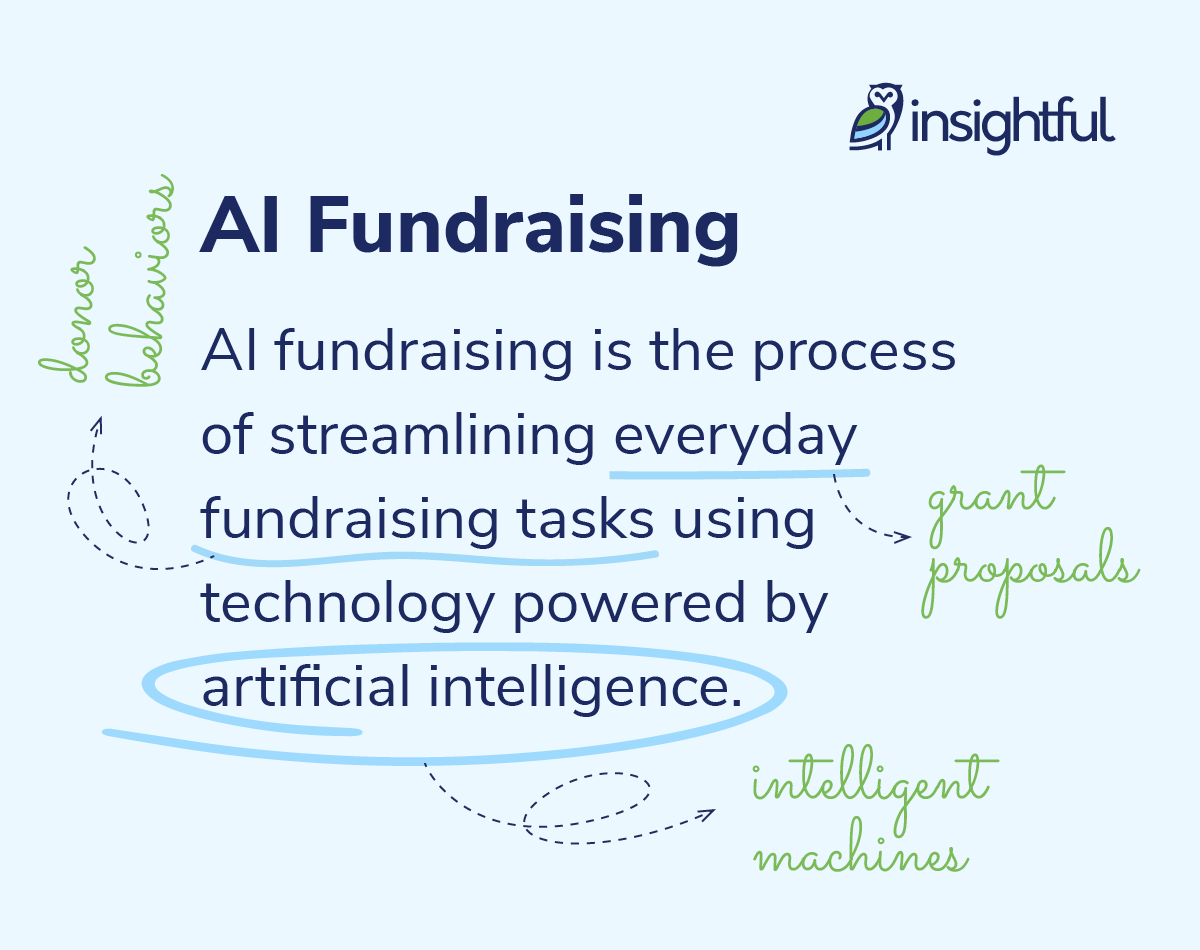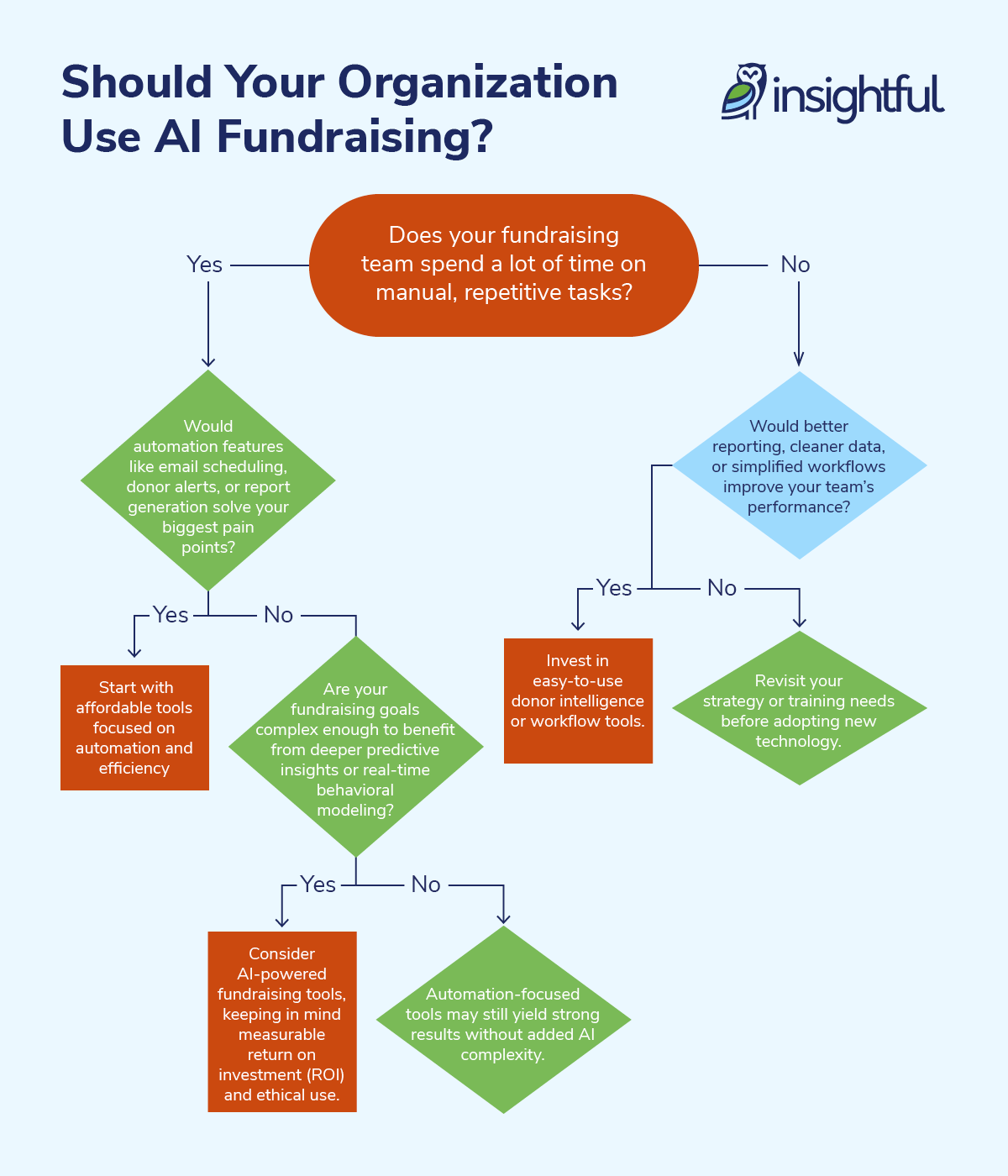The Rise of AI Fundraising: Should Your Org Get On Board?
By Sarah Landman, Executive Vice President, Insightful
Artificial intelligence (AI) is an increasingly popular topic, thanks to its widespread impact on individuals and organizations across every vertical. Students use it to write term papers, and providers use it to predict patients’ health needs. Why shouldn’t your organization use it to fundraise?
While interest in AI abounds, inconsistent implementation continues to trend for these tools. Both leaders and the public continue to debate AI usage due to ethical concerns, its lack of human influence, and regulatory gaps. If your organization is unsure whether AI fundraising will streamline your efforts and improve results, this guide is for you.
Looking for more insights on tech-driven donor engagement?
What is AI Fundraising?
AI fundraising is the process of streamlining everyday fundraising tasks using technology powered by artificial intelligence. Essentially, AI tools can “think” like a human, allowing the machine to generate content or complete functions that humans would typically have to.
Let’s unpack each element of that definition for further clarification:

- Artificial intelligence is defined as “the science and engineering of making intelligent machines, especially intelligent computer programs,” according to computer scientist John McCarthy, a “founding father” of AI.
- Fundraising tasks can range from writing grant proposals to predicting donor behaviors. We’ll discuss specific use cases later, but it’s important to note that AI tools can be applied to a wide range of functionalities.
Notably, the aspect of human intelligence that AI can’t replicate is emotion or personal experience. That’s what makes implementing these tools so tricky, especially when appealing to someone’s emotions in an effort to acquire donations.
What Are AI Fundraising Tools?
AI fundraising tools refer to the computer programs that process data through a mathematical model (called an algorithm) and use that contextual information to perform fundraising tasks. There are two primary types of AI tools used for fundraising:
- Generative AI creates written or visual responses to your inputs. For example, Google users will find that their search engine queries often return an AI Overview, which summarizes the top search results into a quick answer powered by generative AI.
- Predictive AI forecasts future outcomes based on its analysis of vast datasets. For example, Gmail’s Smart Compose feature offers suggestions as you enter text, personalized according to your previous writing style and habits.
While many platforms tout themselves as AI fundraising tools, it’s important to note that AI is a technology that can be applied to any program. In fact, you may already be using AI without realizing it.
For instance, have you ever used your iPhone to ask Siri a question or prompt it to send a text? Siri uses AI algorithms to understand what you’re saying and perform certain tasks. Even social media platforms, like Facebook, use AI to personalize content delivery in your news feed.
AI’s current prevalence in our daily lives begs the question: What makes AI fundraising tools different?
The truth is, not much. Although AI holds significant potential (if used ethically and effectively) to improve donor cultivation and fundraising efficiency, you don’t need a fundraising-specific tool to make the most of this technology. That’s not to say that these tools would make poor additions to your organization’s tech stack; you’ll just have to decide which tools best serve the purpose you’re trying to fulfill.
Get the fundraising efficiency you’re looking for, without the drawbacks of AI fundraising
Ethical Considerations in AI Fundraising
Just as with any new technology, there are several unknowns and concerns surrounding AI fundraising. While this technology may have numerous benefits for your organization’s fundraising processes, it also has implications for those whose data the AI uses—your supporters.
As such, it’s critical to understand their concerns and take necessary steps to use AI responsibly in light of them. Here’s how you might address a couple of common donor concerns:
- Concern: 85% of cybersecurity professionals attribute recent attacks to bad actors using AI, leaving AI adopters worried about the security of their data. Especially in fields like healthcare, which handle sensitive patient information and are already prone to data breaches, leaders must be careful not to compromise data safety for convenient technology.
- Solution: Review the data-sourcing practices of any AI fundraising tools you consider working with before requesting a demo of the software. Set strong internal policies for ethical data sourcing to ensure your fundraising team complies with relevant legislation and best practices.
- Concern: While many AI models claim to use “publicly available data,” there is growing mistrust about the safety of personal data. In fact, 81% of those familiar with AI say companies' use of it will lead to people’s personal information being used in ways they won’t be comfortable with.
- Solution: Ask supporters for their consent before integrating their data into your AI fundraising processes. Transparently describe how their information will be used and allow individuals to opt out before sharing sensitive details, like their contact information or address.
An easy first step to take in responsible AI use is regulating it. 66% of the nonprofit sector alone reports already using some type of AI, but 78% don’t have an organizational policy guiding AI usage. Thinking through and writing out your commitment to ethical AI use is a strong foundation upon which you can build successful fundraising practices.
Above all, the most important way to mitigate ethical concerns in AI use is to stay informed about evolving best practices and regulations. Use a framework, such as the Fundraising.AI Collaborative’s Responsible AI Framework, to keep your organization’s practices and policies in check.
Use Cases of AI For Fundraising
AI can be applied to many different areas of the fundraising process, but your organization doesn’t have to overhaul its entire workflow. Your team may find it useless for some fundraising tasks, or not useful for your nonprofit at all.
Instead, identify the areas that consistently drain your team’s time and energy, and start there. Some common starting points include:
- Personalize donor communications. AI can segment donor lists and tailor email content to different audiences based on shared characteristics.
- The caveat: Your CRM likely offers the same capability, especially when integrated with prospect research tools that provide recent and relevant donor intelligence. If so, you may be able to avoid an additional investment in new technology.
- Make informed fundraising asks. AI tools can analyze donor engagement and capacity data to help you determine the best time, method, and amount for individual solicitations.
- The caveat: No AI model can capture donors’ motivations and emotions. While your team can certainly accept the suggestions offered by these tools, they’re no replacement for authentic fundraising requests with a human touch.
- Automate daily workflows. Repetitive tasks like data entry or basic reporting may be streamlined with AI.
- The caveat: Automation isn’t inherently AI-dependent; numerous fundraising tools automate workflows without requiring AI implementation. For example, Insightful Philanthropy’s donor news alert service automatically delivers real-time donor intelligence without using AI algorithms.
With this context about AI’s fundraising capabilities, it’s worth considering whether there are non-AI-focused tech options that serve similar purposes.
Get the fundraising efficiency you’re looking for, without the drawbacks of AI fundraising
How to Decide If AI Fundraising Is Right For You
Investing in AI for fundraising doesn’t have to be an “all-or-nothing” decision. When deciding whether to use an AI fundraising tool, it’s important to first assess your team’s needs, technical readiness, and goals.
Here are some questions to keep in mind when you consider whether to implement AI:

- Does your fundraising team spend a lot of time on manual, repetitive tasks?
- If yes, would automation features like email scheduling, donor alerts, or report generation solve your biggest pain points?
- If yes, start with affordable tools focused on automation and efficiency.
- If no, are your fundraising goals complex enough to benefit from deeper predictive insights or real-time behavioral modeling?
- If yes, consider AI-powered fundraising tools, keeping in mind measurable return on investment (ROI) and ethical use.
- If no, automation-focused tools may still yield strong results without added AI complexity.
- If no, would better reporting, cleaner data, or simplified workflows improve your team’s performance?
- If yes, invest in easy-to-use donor intelligence or workflow tools.
- If no, revisit your strategy or training needs before adopting new technology.
- If yes, would automation features like email scheduling, donor alerts, or report generation solve your biggest pain points?
AI isn’t a must-have for every organization, and that’s okay! Just as these tools offer numerous benefits, there are several valid considerations that could reasonably lead your organization to take a pause before investing.
Whether you decide to go all in, choose just a few AI-driven tools, or keep your tech stack AI-free, what matters most is that your organization finds a solution that best fits your needs.
The Solution: Substitute With Adequate Tools
Despite the current trend of chasing AI-powered solutions, many valuable, efficient tools simplify workflows without the complexity of predictive modeling or the ethical risks involved.
Our take: Fundraising should be more human than algorithmic. While this technology can be beneficial to some teams, the most important element of AI adoption is keeping a donor-centric mindset. Furthermore, AI isn’t the only fundraising tool that can deliver timely prospect insights, minimize manual tasks, and overall streamline your fundraising efforts.
Insightful Philanthropy’s donor news alert solution prioritizes the human element. It shows your fundraising team what’s really going on in donors’ lives to you them make informed (and appealing) outreach. From life events to philanthropic activity to obituaries, Insightful’s platform surfaces relevant data that allows fundraisers to get to know their audience on a deeper level.
Discover a fundraising tool that supports a tech-assisted—not tech-led—approach.
Insightful Philanthropy delivers fast, reliable alerts about donor activity using 14,000+ news and information sources.
